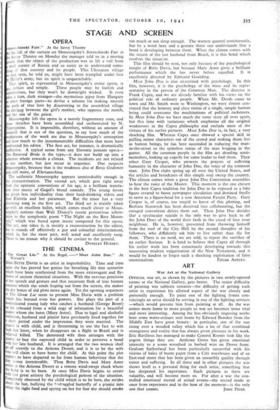STAGE AND SCREEN
OPERA
sorotchinski Fair." At the Savoy Theatre T the fall of the curtain on Moussorgsky's Sorotchinski Fair at e SavoY Theatre on Monday the manager told us in a moving peech that the object of the production was to lift a veil from small corner of Russia and so assist us to understand some- ing of that country and its • people. This Ukrainian village e had seen, he told us, might have been trampled under foot v Hitler's army, but its spirit is unquenchable.
That spirit, as represented in Moussorgsky's comic opera, is ), robust and simple. These people may be foolish and
perstitious, but they won't be downright wicked. It even es a lean, dark stranger—the mysterious gipsy from Hungary other foreign parts—to devise a scheme for making smooth e path of true love by discovering to the assembled village e intrigue between the girl's mother, who opposes the match, d the son of the priest.
Moussorg-sky left the opera in a merely fragmentary state, and ese sketches have been assembled and orchestrated by N. cherepnine. It is impossible, therefore; without an amount of earch that is out of the question, to say how much of the eaknesses of the work are due to Moussorgsky's conception d how much to the insurmountable difficulties that must have nfronted his editor. The first act, for instance, is dramatically ffective. A typical scene from any Slavonic peasant opera— he Bartered Bride is the type,—it does not -build up into a herent whole towards a climax. The incidents are not related o one another, but just occur in sequence. One suspects oussorgsky, because that is the weakness also of Boris Godonov d, still more, of Khovantchina.
The authentic Moussorgsky appears unmistakably enough in he characterisation. The second act, which gets right away tom the operatic conventions of his age, is a brilliant transla- ion into music of Gogol's broad comedy. The young lovers given less individuality than their hard-drinking elders and an Khivria and her paramour. But the tenor has a- very arming song in the first act. The third act is mainly taken p with an excellent ballet, which comes much closer to MouS- rgsky's notions than Walt Disney's recent pretentious solem- nes to the symphonic poem "The Night on the Bare Moun- ain," which was based upon music composed for this opera. is act, one takes it, is mainly a reconstruction by the editor, ut it rounds off effectively a gay and colourful entertainment, hich is, for the most part, well acted and excellently sung. ere is no reason why it should be caviare to the general.
DYNELEY HUSSEY.


























 Previous page
Previous page